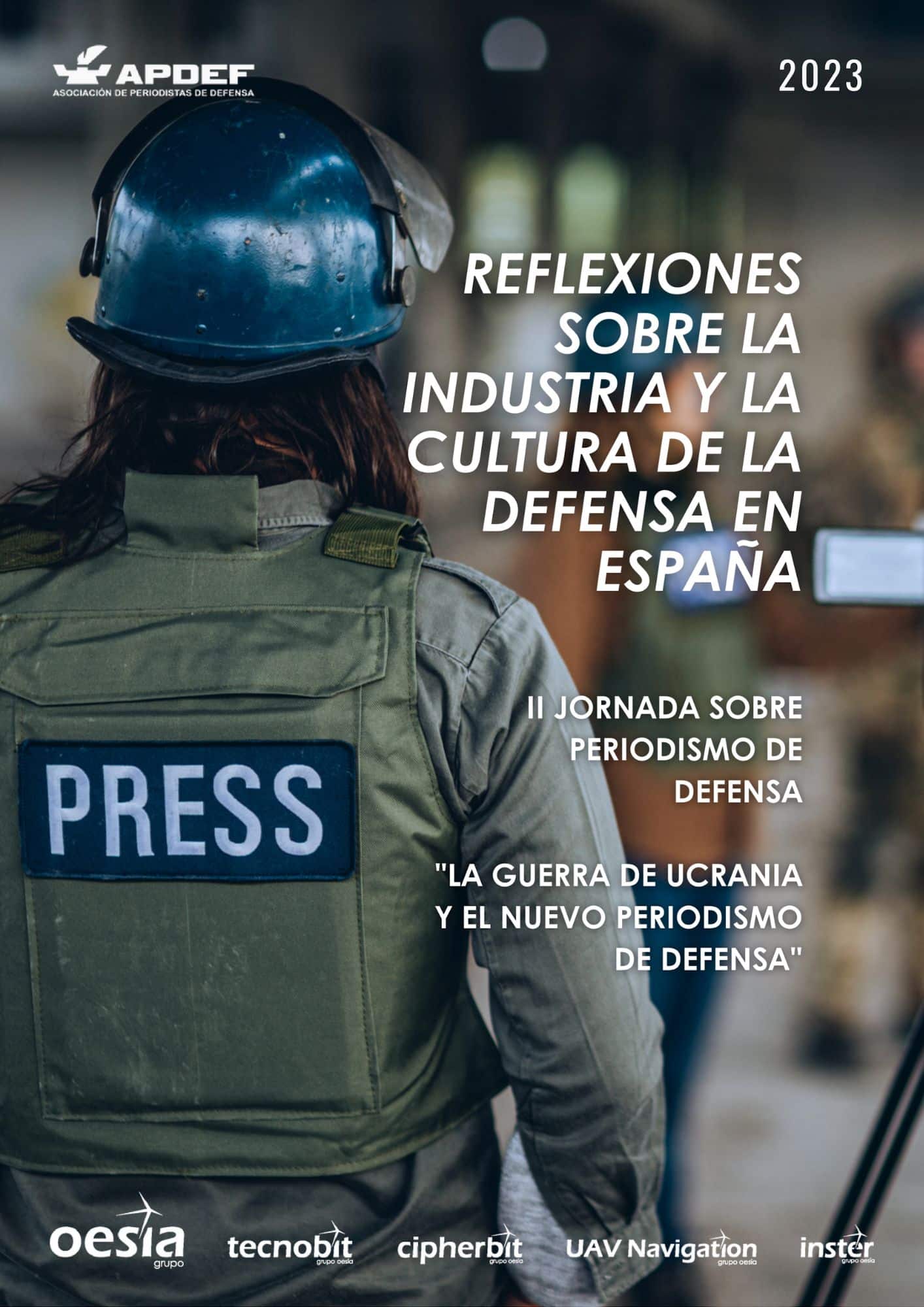2nd Conference on Defense Journalism – The war in Ukraine and the new defense journalism

Introduction
This report compiles the main ideas of the second edition of the series on Journalism and Defense organized by Grupo Oesía, the APDEF (Association of Defense Journalists) and the Complutense University of Madrid.
Under the theme “The Ukrainian War and the New Defense Journalism,” academics, students and journalists joined representatives from the Defense Industry, the Armed Forces and industry think tanks to reflect on the implications of war, communication and journalism.
During the day, representatives from both worlds discussed the important role of the Defense Industry in today’s world.
This document is intended to serve as a tool for reflection and documentation for all those interested in communication related to the Defense Industry, and evidences the need to inform and educate Spanish society in a culture of Defense.
The executive president of Grupo Oesía participated in the event, Luis Furnells, Jorge Clemente, dean of the Faculty of Information Sciences of the UCM, Miguel Ángel de la Cruz, president of APDEF, Rafael Moreno, former war correspondent, director of communications and institutional relations of Santa Bárbara Sistemas and professor of journalism, Ricardo Martí Fluxá, President of TEDAE, Jesús Argumosa, Major General and former head of the School of Higher Defense Studies, Félix Arteaga, senior researcher at the Elcano Royal Institute, Juan PonsColonel in the Spanish Army, specialized in space, aeronautical and defense matters.Íñigo Nieto, Íñigo NietoCaptain, responsible for strategic communications at EMAD and a specialist in information warfare, Laura from Chiclanawar correspondent awarded by APM 2023, Juanjo FernandezDefense Editor of El Confidencial, and Rafael CalduchProfessor of International Relations at UCM.
The importance of the Defense Industry
A key element for deterrence
The Defense Industry has a fundamental role as a protective barrier due to its deterrent power. Ultimately it is the one that safeguards our democratic values and freedom.
The war in Ukraine has shown that the security of our borders is not guaranteed. European nations need to have elements that guarantee their security. The outbreak of the war in Ukraine has reminded us how important it is to be protected against possible external threats, and the first step is to have deterrents in place to maintain this protection, to allow us to safeguard our model of life and to prevent outsiders from trying to impose other models of society on us through the use of force.
It is necessary to invest in the defense industry, not to fight wars, but to ensure that this protection is effective and that we are prepared to respond when situations like the current one arise. Deterrence capabilities and resources must be in place.
A key element for the economy
The government has committed to reaching 2% of the defense budget by 2029. In this way it will fulfill the Cardiff commitment reached with NATO. This historic and courageous decision by the Government is also an important decision for the Spanish economy, because the defense industry has a turnover of around 7 billion euros.The company generates some 50,000 direct jobs, benefits around 200,000 families and has the capacity to provide the backbone of the national territory.
We need to make a much greater investment so that the Defense Industry is able to protect us and really support our partners and contribute to defense at the European level.
The steps that have been taken as an industry in recent times have been gigantic. Although it does not have the size that would be necessary, it has safeguarded sufficient investment and capacity that has allowed us to achieve a certain degree of relevance in the European environment, both in terms of price and quality, and to export products and technology.
The Spanish defense industry is currently making a qualitative and quantitative leap forward. If completed, it will not only contribute to our economic situation, but also to our reputation because it will be another way for us to export the Spain brand.
A key element to support our allies
Industry is necessary to win wars. If you don’t have sufficient industry, as is the case with Ukraine today, it is impossible to win a war. It is at that moment that you have to be able to count on allies that allow you to endure and face the challenges of a war.
Ukraine is counting on the support of Western powers, yet their contribution is proving insufficient. Europe had not experienced a war at close quarters for more than 70 years and when it returned, we realized that we were not sufficiently prepared, as an industry, to meet our commitments.
The war in Ukraine has become a war of attrition, a war of trenches, with no significant breakthroughs merely because of a productive issue. Neither Russia nor Ukraine has sufficient industry and productive capacity to move forward and take significant steps.
A key element for national sovereignty
The Defense Industry is critical to meeting 3 key objectives for any nation:
- To protect the freedom, rights and welfare of citizens.
- Guarantee the defense of the nation and constitutional values.
- Contributing to international security, as partners and allies
The Defense Industry is capable of generating national sovereignty for countries, and also an industry that enables Europe’s strategic autonomy.
A key element for innovation and technological development
The Defense Industry is technology intensive. It has a strong transforming and innovative capacity because, beyond what may be thought superficially, the Defense Industry is not only armaments and ammunition, it is an intensive industry in research, innovation and technology. The Armed Forces work with tools that incorporate the most advanced technologies.
European institutions, especially in recent times, have been working hard to promote the defense industry, not only as a strategic sector, but also as a key sector for the development of technology and innovation. Investment in defense will enable Europe, and all member countries, to make progress in R&D&I.
In addition, investment in the Defense Industry also has a strong social impact, since technologies initially intended for defense always end up impacting civil society with advances and applications of high added value. In addition, the Defense Industry also promotes and fosters talent within universities, trains and develops it.
The importance of a Defense Culture
What is not communicated does not exist. In Spain, historically, there has been no communication associated with the Defense Industry. As a result, society in general is unaware of what this industry really is, its implications, how it works and its importance.
The Spanish defense industry is in dire need of a story. It is necessary to explain and transmit to civil society what the Defense Industry is and what it entails. It is necessary to build a Defense Culture that hardly exists in our country. We must build a narrative and be able to convey to citizens how the Defense Industry makes a crucial contribution to national sovereignty and helps to raise our specific weight in international institutions and organizations.
Not only is it necessary to promote the Defense Culture among the general public, it is also very important to spread it among the leaders, the social elites, the decision makers. If this does not happen, budgets and investments will end up declining again, with all the negative implications that this would entail.
The current situation favors the promotion of a Defense Culture. The public and leaders are more receptive to Defense-related messages. We must take advantage of the contingency to promote a true Defense Culture and avoid the risk of returning to the old conception of the Spanish Defense Industry once the war situation in Ukraine ends.
Defense Journalism
Although there is important work being done by the communications offices of the companies in the sector and, of course, by the Armed Forces, the creation of the figure of the “deterrence journalist” seems advisable for the expansion of a Defense Culture. There have always been journalists and war correspondents. Their work is very important and commendable, but we should also start talking about “deterrence journalists”.
The press must also communicate what needs to be done to prevent wars and what is necessary to keep our society and our country safe and defended. That task goes far beyond reporting conflicts when they occur. It is also necessary to inform and communicate about everything that lies behind a safe world.
Journalists can contribute a great deal to Defense Culture, and even to defense itself. It is important that what until now has been purely the domain of the military should also be understood by the general public. The complexity and implications of everything related to the Defense Industry must be translated to society in general. It is necessary to make the Defense Industry understandable.
Information and disinformation in war contexts
In recent years, three milestones have marked the international reality: Brexit, Covid-19 and Trump’s rise to power.
Today, we are facing another new milestone: the war in Ukraine. Russia does not currently have a military industry powerful enough to win the war it is fighting, so it has chosen to use the weapon of disinformation. In this way, it has managed to create a cognitive bubble thanks to propaganda. In Russia, the media is controlled to such an extent that citizens become “cognitive zombies”. This makes it virtually impossible for the West to penetrate Russia with information.
The Russian leadership has managed to make people believe that in Russia there is no war against Ukraine, but a war against the Nazis and a mission to rid Europe of the Nazis, just as they did in World War II. Thus, the Russians fight with conviction, for a just cause, regardless of deaths, damages, etc.
To overcome and advance in the current state of war, the right thing to do, according to many experts, is not a military resolution, but the possibility of reaching a political agreement, in which both parties will lose, defined by China and the United States.
To fight against disinformation, it is important to maintain the essence of journalism, which is based on seeing, hearing and, later, telling what happened, one of its main functions being to fight against disinformation. Such disinformation is not only generated by false news or hoaxes; sometimes it is news based on true facts but which are misinterpreted and to which false conclusions are attributed.
War correspondents come to tell human stories, to give a voice to the voiceless and to bring continuity of information to all war experiences. Professional ethics are sufficient to establish the limits that must not be crossed to protect the people involved in these conflicts.
At certain times, these correspondents encounter difficulties, such as little media space to report, prejudices regarding the age and gender of the journalist, lack of means, language barriers… among other aspects that arise on a daily basis. Even so, on most occasions they are welcomed and are grateful for the kindness of the local population.
Therefore, it is important to remember the importance of information, which functions as another weapon. In order to make a good analysis of the situation to be told, it is important to know how to listen carefully and humbly. Many opinions must be heard from those in the know in order to generate one’s own.
